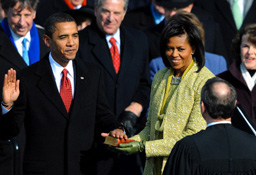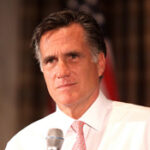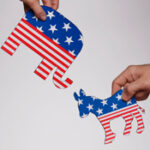- Current Events New Alabama Congressional District Selects Candidates
- Current Events Nebraska Rejects Winner-Take-All Proposal
- Citizenship Voting Under Age 18
- Citizenship Citizenship in Action
- Democratic Party Biden’s and Trump’s Recent Primary Results
- Elections Trump and Biden Win South Carolina and Michigan Primaries

The Promise and Price of Citizenship
On January 20, Barack Obama was inaugurated as the 44th president of the United States—the first African American to hold the nation’s highest office.
An estimated 1.8 million people braved the cold to attend the inauguration ceremony. The new president took the oath of office on the steps of the U.S. Capitol using the same Bible that Abraham Lincoln used for his inauguration ceremony. The historic Bible is part of the collection of the Library of Congress. Chief Justice John G. Roberts administered the oath of office.
Following the oath of office, Obama gave his Inaugural Address, spelling out the challenges Americans face:
That we are in the midst of crisis is now well understood. Our nation is at war, against a far-reaching network of violence and hatred. Our economy is badly weakened, a consequence of greed and irresponsibility on the part of some, but also our collective failure to make hard choices and prepare the nation for a new age. Homes have been lost; jobs shed; businesses shuttered. Our health care is too costly; our schools fail too many; and each day brings further evidence that the ways we use energy strengthen our adversaries and threaten our planet.
The challenges may be new, the president said, but the traditional values of America are our best hope to meet these challenges:
What is demanded then is a return to these truths. What is required of us now is a new era of responsibility—a recognition, on the part of every American, that we have duties to ourselves, our nation, and the world, duties that we do not grudgingly accept but rather seize gladly, firm in the knowledge that there is nothing so satisfying to the spirit, so defining of our character, than giving our all to a difficult task.
This is the price and the promise of citizenship.
After the address, President Obama accompanied outgoing president George W. Bush to the Marine Corps helicopter that took Bush and his wife, Laura, to Andrews Air Force Base. From there the former president and Mrs. Bush boarded a jet for Crawford, Texas.
The 56th Inaugural Parade then made its way down Pennsylvania Avenue from the Capitol to the White House. Several hundred thousand people had already gathered along the parade route. Some had taken places along the route as early as 3 a.m. Twice during the parade, Obama and his wife, Michelle, stepped out of the limousine to walk and greet the crowd.
The day’s festivities continued with the inaugural balls held throughout the Washington, D.C., area. The tradition of the inaugural ball started in 1809. First Lady Dolley Madison held the first ball for her husband, James Madison. Obama, and his wife, Michelle, attended the 10 official inaugural balls, including the Commander-in-Chief’s Inaugural Ball. Invited guests to this ball included families of fallen heroes, soldiers wounded in action, and spouses of men and women serving in Iraq and Afghanistan.
Obama’s inauguration was the culmination of a campaign and election that was historic in many ways. The nation’s first African American president was a first-term Democratic senator who just five years earlier was serving in the Illinois state senate. Rarely has a newcomer to the national political stage won the presidency on his first try.
Another notable result was the election of Obama’s running mate, Vice President Joe Biden of Delaware. Biden is the nation’s first Roman Catholic vice president. Governor Sarah Palin of Alaska also made history as the first woman vice presidential nominee of the Republican Party.
Read the full text of Obama’s speech here.


